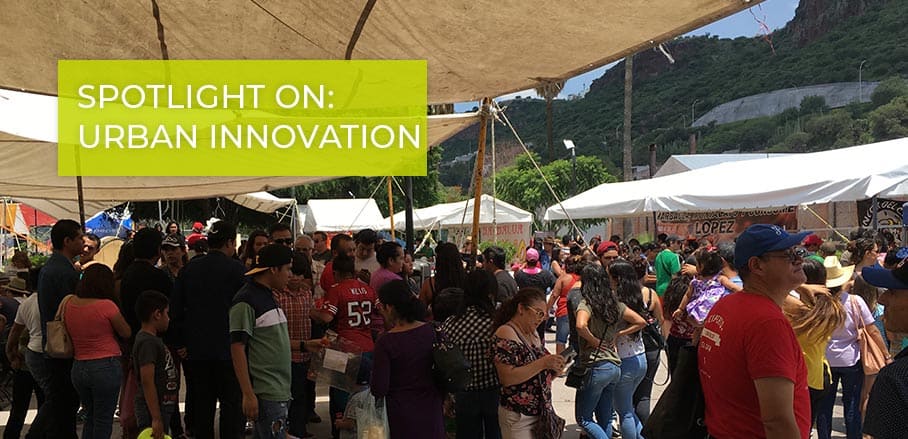Linking to Your Local Producer: Urban Innovation in Mexico
Mexican cities feature an array of innovative market formats, redefining producer-consumer relationships while creating interactive, public spaces at the same time. Jorge Javier and Dr Cecilia Tortajada on the reinvention of old institutions.
The Case for Urban Markets
Mexico is a very diverse country with respect to history, archaeology, biodiversity, and culture. This also applies to the population, where more than 7.3 million people belong to indigenous groups with very distinctive cultural practices. Indigenous groups, including artisans and small producers, have traditionally been forced to sell their products through intermediaries, which has imposed numerous costs. While one option for them has been to sell their goods in traditional open markets known as tianguis that are held on certain days in both urban and rural areas, this has not solved the problems imposed by of intermediaries. Tianguis comes from tiyānquiztli in Classical Nahuatl, the language of the Aztec and Toltec civilizations in Mexico.
A solution for those who sell organic and higher quality products may be what is known as alternative urban markets. These have been established by individuals, community organisations, and private-sector groups in urban areas. They provide public spaces, where products can be sold directly to consumers, thus bypassing intermediaries and resulting in higher income for the producers. While also promoting a more sustainable circular economy, they contribute to implementation of the UN Sustainable Development Goals that demand equality for vulnerable populations such as local producers and indigenous farmers.
Mexico City: Mercado El 100
In Mexico City, there is the well-known Mercado El 100 (100 Market). It is the result of the initiative of young entrepreneurs who, after several years of research, decided to set up a system through which the urban population would be able to buy organic products directly from the farmers.
Open markets are not new: they have existed for centuries all over the world as places to sell, exchange, and purchase goods. What makes the alternative urban markets so important at present, is that they link consumers and small producers who sell organic and higher quality products in times when markets are losing their relevance to urban consumers who prefer large supermarket chains.
Querétaro: Craft Beer and Culture
In the state of Querétaro, 200 kilometres north of the Mexico City Metropolitan Area, there are growing numbers of urban initiatives to bring together small producers and consumers in both public and private spaces. These include, for example, the recently listed Craft Beer Route, where several small pubs open their doors for local producers and artisans to sell their products. There is also the Factory, a mini cultural centre with a theatre and restaurants that appeal more to the younger generations – and that provides a space to trade regional products that are organic or vegan.
Ezequiel Montes: Wine, Cheese, and Knowledge
Some of the oldest productive areas in the state are the vineyards around the municipality of Ezequiel Montes. They also play an important role in promoting local production. These vineyards have eight large wine cellars, where events for local farmers are hosted, including festivals for the communities in the region. Every year, during the grape harvest, a local market is organised for farmers, artisans, and local artists, as well as the indigenous population, to sell their products, and also share their ancestral knowledge.
Quesos VAI (VAI Cheeses), one of the largest producers in the region, has been producing different types of cow and goat cheeses since the 1920s. In addition to growing their own business, they have supported local entrepreneurs. In their small Museum of Wine and Cheese, visitors can taste the products of local farmers and learn about local history. Recently, they also founded a small association of cheese producers to resist the economic effects of the pandemic.
The Need for Local Governance
Urban initiatives that provide a space for butchers, cheesemakers, greengrocers, local farmers, small producers, and sellers in general, often require changes in local governance. These include authorisation for markets to be established within certain residential developments and operate at certain times, and that areas allocated are large enough to accommodate all groups comfortably. The municipal government also should grant easement on land lease/purchase options.
New urban initiatives as well as traditional ones such as Tianguis are being reworked and rearranged to promote urban regeneration. In this context, the guidelines of ecological urbanism as well as legal requirements of land use planning are followed. This is made possible by temporarily adjusting land use plans to grant commercial status – a practice, which can also generate tax revenues.
In Mexico, many initiatives have already proven to be successful, even during the current pandemic. However, more needs to be done. Local farmers and indigenous communities need support to develop business models and logistics that are more robust and that help them sell their products on a continuous basis and at fair prices. Use of new technology, such as electronic payment systems, would be beneficial, as it could attract more urbanites.
Preserving Traditions, Offering Innovation
These spaces create a very local, efficient service that attracts people from all around the cities. They are important culturally, as they often host events that pass down and preserve cultural traditions, and promote the sale of products that are representative of unique indigenous cultures. Last but not least, they foster awareness on the importance of healthier agricultural products, promote social interaction, and represent an alternative for people who do not wish to depend on large companies or support products that have large environmental footprints. All these initiatives make a valuable contribution to the cities and deserve to be supported.
- The Right to Livability: Tackling Suburban Spaces and Peripheral Settlements - 14. November 2023
